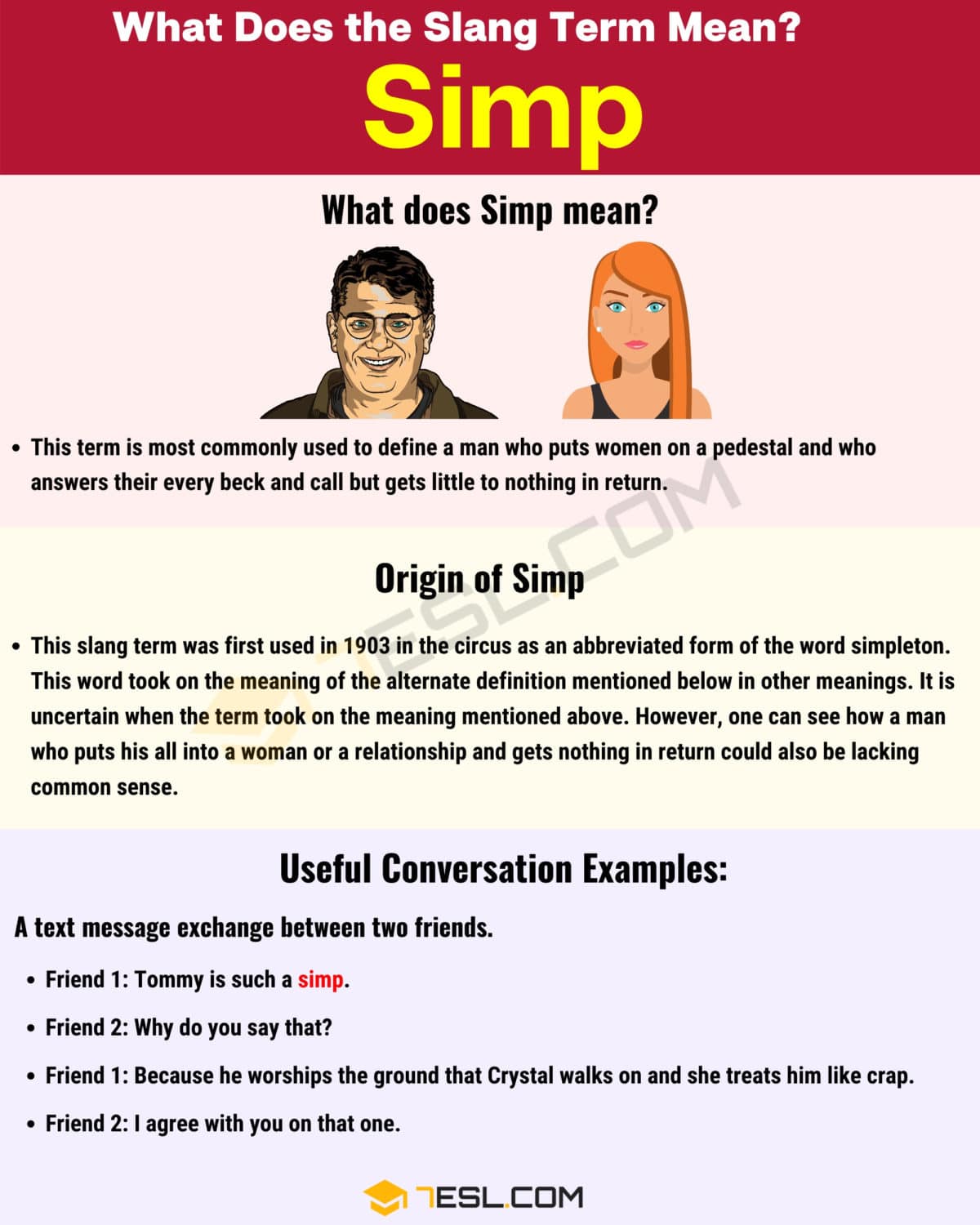What Does "Simp" Mean? - Origins, Usage & More
Is "simp" just another fleeting internet fad, or does it reveal something deeper about our evolving social landscape? The rise of "simp" as a widely-used, often derogatory term highlights the complex interplay of gender dynamics, social media influence, and the ever-changing nature of language in the digital age.
The term "simp" has rapidly permeated the lexicon of online culture, transforming from a niche slang term to a mainstream concept. Originating in the 1980s, its resurgence in late 2019 and early 2020 can be largely attributed to a TikTok trend, particularly among male members of Generation Z. At its core, "simp" is a pejorative label applied to men perceived as excessively attentive and submissive towards women, usually with the unfulfilled expectation of romantic or sexual reciprocation. This dynamic isn't new; the behaviors the term describes have been around for ages. What is novel is the speed at which the language surrounding it is constantly changing.
| Category | Details |
|---|---|
| Definition | A slang insult for men who are seen as too attentive and submissive to women, especially out of a failed hope of winning sexual attention or activity from them. Shortening of "simpleton". |
| Origin | Believed to have originated in the African American community in the early 2000s, but gained massive popularity in the late 2019 and early 2020s. |
| Usage | Used as a noun or verb to describe someone who shows excessive devotion or does way too much for a person they like. Common in online communities, social media, and gaming circles. |
| Context | Often associated with toxic masculinity and sexism, and used in toxic online communities. |
| Synonyms | Simpleton, sycophant, beta, cuck (in toxic contexts). |
| Antonyms | (Not explicitly defined, but implies someone who is not submissive or overly attentive.) |
| Examples | "He's such a simp, buying her flowers every day." "I'm simping for this new game." |
| Related Concepts | Toxic Masculinity, Sexism, Friend Zone, Incel Culture |
| Source of Information | Urban Dictionary |
The term's journey from the word "simpleton" to online slang is a testament to how language adapts and evolves, reflecting the changing social landscape. "Simp," in its contemporary usage, encapsulates a complex set of behaviors, motivations, and social dynamics, often prompting discussion about the roles and expectations of men and women in relationships. It highlights issues of power dynamics, social expectations, and the challenges of navigating romantic interactions in the digital age.
- Cornelia Brown Frustration Backtoschool Guidelines Change Latest
- Danielle Gordon Mental Health Eating Disorder Specialist Find Help Today
Urban Dictionary's top definition nails the crux: "someone who does way too much for a person they like." Other definitions expand on this, with a common thread being excessive affection or effort, frequently without the efforts being reciprocated. This can range from showering someone with gifts and compliments to consistently putting their needs ahead of one's own, all in the hopes of achieving some level of romantic or sexual involvement. This dynamic often unfolds in the "friend zone," where one person's feelings are not returned, leading to a one-sided pursuit.
The idea of devotion and romantic gestures, the hallmarks of many romantic comedies, can turn somewhat unsettling in real-life. Consider the implications: a person consistently prioritizing another's desires, often at their own expense, without mutual investment. This is often the context that the term simp is used, emphasizing the one-sided nature of the effort.
The meaning of simp can vary depending on the context. The term functions both as a noun and a verb. As a noun, it labels someone as a "simpleton," a foolish person, or someone foolishly devoted to a romantic interest. Used as a verb, it means to exhibit excessive devotion. This versatility makes it easily adaptable to different situations, whether youre using it to describe a person's behavior or their actions.
- Simple Robbery Definition Examples And Legal Nuances Explained
- Thomas Mcfaddens Wild Story From Prison To Film Adaptation Beyond
The term has a strong association with problematic aspects of modern society. Critics contend that "simp" perpetuates toxic masculinity and contributes to sexist viewpoints. This perspective argues that the term belittles men for expressing any level of emotion or affection toward women, contributing to the pressure for men to be stoic and emotionally detached. It can also be weaponized within toxic online spaces, often used to shame or ridicule men who demonstrate perceived vulnerability or emotional investment in romantic pursuits.
The slang term has spread across online channels, from gaming circles to social media platforms and even into more extreme spaces such as incel forums, where it gains a particular, often destructive connotation. In these communities, "simp" becomes a tool to demean men for being overly submissive or subservient to women, alongside insults like beta or cuck.
The origins of the term simp are often traced back to the African American community in the early 2000s. Initially, it was used to describe someone considered foolish or silly. However, its meaning has changed over time, and its usage broadened within online spaces.
It's not just a recent trend; "simp" is now a term that's well-established. While the hashtag #simp on TikTok garnered over 870 million views, its popularity across diverse platforms continues. The term's prevalence demonstrates how quickly internet slang can go mainstream, influencing communication styles and social perceptions across generations.
Examples abound across the internet to illustrate the term's versatile application. The simple declaration, Im such a simp for chocolate, highlights the use of "simp" to illustrate a personal indulgence, while the meme-laden phrase, Call me a simp, but I'll do anything for my cat, demonstrates the phrase's humorous and often self-deprecating usage in online communities.
The term "simp" has sparked many discussions about relationships, gender roles, and emotional expression, specifically online. Those discussions have exposed the nuances of the word and revealed its significance to younger generations. Using this slang can be a form of humor, expressing a fondness for someone or something thats perceived as foolish. However, there are those who view the term through the lens of social criticism.
The evolution of language continues at an unprecedented pace. English, particularly, seems to rapidly absorb new terms. It's interesting to see new words come into use and see how these words affect and change our society. This shift allows us to understand new slang as a reflection of culture and as an ever-evolving phenomenon.
In its most basic form, "simp" is a shortening of the word "simpleton" a term applied to someone considered to be foolish or easily misled. This original definition helps to explain why the label is often wielded as a put-down. It critiques not just the actions, but the perceived motivations, implying a lack of intelligence or foresight on the part of the person being labeled. This inherent criticism is key to understanding the impact and context of "simp" in contemporary usage.
Consider the various facets of the term "simp" : The phrase is an acronym for a number of things, used as slang and an insult in its original form. The use of such a term also has other meanings depending on what context it's being used in, as well as being associated with broader issues like toxic masculinity and sexism. Furthermore, it is being used across a broad array of online communities, on social media platforms, and in gaming circles. All the while, this term has developed in meaning, and it continues to spark conversations about evolving dynamics. The rapid acceptance of slang terms such as "simp" reveals that language reflects changes in our society.
The term's endurance, and the debates it provokes, shows its significance in our culture. "Simp" is not merely a word; it's a social commentary, a reflection of shifting dynamics, and a testament to the dynamic nature of language in the digital age. Its continued usage is evidence of this term's place in culture.



Detail Author:
- Name : Gilberto Gottlieb
- Username : vladimir.kuhic
- Email : bode.bella@hotmail.com
- Birthdate : 1987-09-02
- Address : 7118 Sydnie Station Cruickshankmouth, RI 23618-8362
- Phone : 818-661-1631
- Company : Ankunding and Sons
- Job : Log Grader and Scaler
- Bio : Placeat debitis dolores veritatis aut hic laboriosam. Quas voluptate assumenda repellat.
Socials
facebook:
- url : https://facebook.com/paulafisher
- username : paulafisher
- bio : Laborum eos cumque ratione qui.
- followers : 1423
- following : 2785
instagram:
- url : https://instagram.com/paula4782
- username : paula4782
- bio : Quo corrupti nisi qui eligendi. Eos vel assumenda vel laboriosam adipisci quaerat occaecati.
- followers : 1612
- following : 871
twitter:
- url : https://twitter.com/paula_xx
- username : paula_xx
- bio : Nesciunt ea ipsam tenetur ad eligendi et debitis. Quis vel quo consequatur fugit. Facere non autem eum aut qui.
- followers : 2188
- following : 925
linkedin:
- url : https://linkedin.com/in/paula.fisher
- username : paula.fisher
- bio : Fuga placeat illum ratione natus.
- followers : 5489
- following : 1959
tiktok:
- url : https://tiktok.com/@paula_fisher
- username : paula_fisher
- bio : Maiores voluptas aut cumque aspernatur iusto eos aut.
- followers : 911
- following : 2912